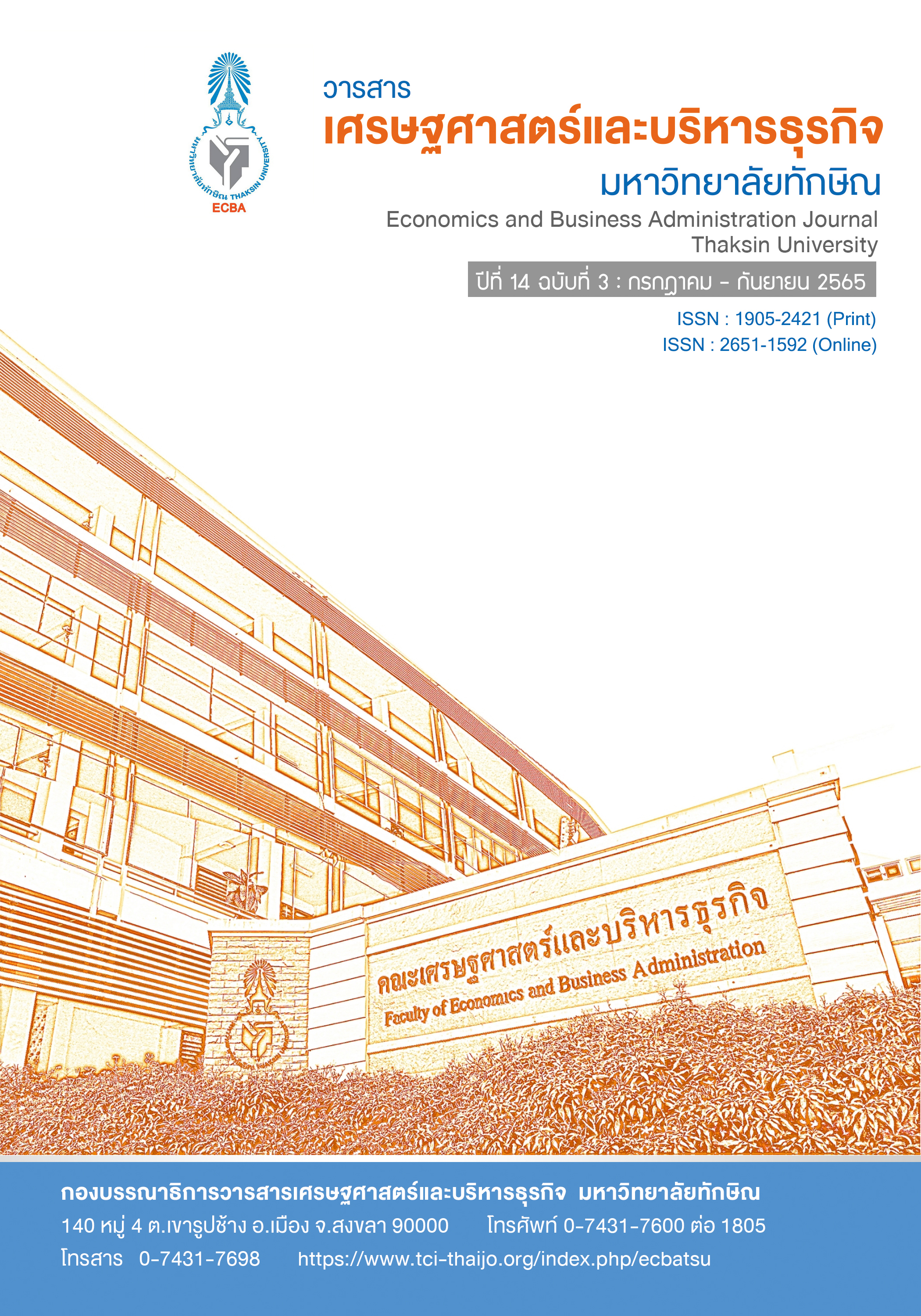The Influence of e-Service Quality and Trust on Repurchase Intention of Online Shopping in Thailand
Keywords:
e-Service Quality, Trust, Repurchase IntentionAbstract
The objectives of this research were to study 1) the effect of e-service quality on repurchase intention of online shopping in Thailand 2) the effect of e-service quality on trust of online shopping in Thailand 3) the effect of trust on repurchase intention of online shopping in Thailand. Data were collected from 300 online questionnaires. The statistics included mean, percentage, standard deviation and using the structural equation model to analyze and test the hypothesis.
The result shows that e-service quality have both direct and indirect effects on repurchase intention of online shopping in Thailand at statistically significance level of 0.001. E-service quality also has a direct effect on trust of online shopping in Thailand at statistically significance level of 0.001. Furthermore, trust has a direct effect on repurchase intention of online shopping in Thailand at significance level of 0.001.
From this research, there were important findings that e-service quality and trust are important factors in developing e-commerce strategies. Both of these factors have resulted in online customers having repeat purchase intentions and can use the information obtained from the research as a best practice to create the success factors of e-commerce entrepreneurs in Thailand.
References
Aldhmour, F., & Sarayrah, I. (2016). An investigation of factors influencing consumers’ intention to use online shopping: an empirical study in south of Jordan. Journal of Internet Banking and Commerce, 21(2), 1-50.
Barnes, S., & Vidgen, R. (2002). An integrative approach to the assessment of e commerce quality. Journal of Electronic Commerce Research, 3(3), 114-127.
Bojang, I. (2017). Determinants of trust in B2C e commerce and their relationship with consumer online trust: A case of ekaterinburg, Russian Federation. Journal of Internet Banking and Commerce, 22(8), 1-59.
Carmichael, S. G. (2018). The Flash Report: The Global Digital Economy. Retrieved Agugust 27, 2018, from https://hbr.org/2016/04/the-flash-report-the-global-digital-economy
Chou, S. W., & Hsu, C. S. (2016). Understanding online repurchase intention: Social exchange theory and shopping habit. Information Systems and eBusiness Management, 14(1), 19-45.
Elbeltagi, I., & Agag, G. (2016). E-retailing ethics and its impact on customer satisfaction and repurchase intention. Internet Research, 26(1), 288-310.
Electronic Transactions Development Agency. (2014). 3 Years ETDA enabling digital economy. Bangkok: Electronic Transactions Development Agency.
Fang, Y., Qureshi, I., Sun, H., & Mccole, P. (2014). Trust, satisfaction and online repurchase intention: the moderating role of perceived effectiveness of e-commerce institutional mechanisms. MIS Quarterly, 38(2): 407-427.
Hair, J. F., Money, A. H., Samouel, P., & Page, M. (2010). Multivariate Data Analysis: a global perspective. (7th ed.). Upper Saddle River, New Jersey: Pearson.
Irshad, S. (2016). Mediating Role of Customer Value between Innovative Self Service Technology (ISST) Factors and Online Repurchase Intention. Journal of Internet Banking and Commerce, 21(2), 1-18.
Joshi, D., & Achuthan, S. (2016). E-commerce buying behavior in India: The role of website features in e-loyalty. South Asian Journal of Management, 23(1), 56-88.
Kline, R. B. (2011). Principles and Practice of Structural Equation Modeling. 3rd ed.
Lin, C., & Lekhawipat, W. (2014). Factors affecting online repurchase intention. Industrial Management & Data Systems, 114(4), 597-611.
Liu, T. H. (2012). Effect of E-service Quality on Customer Online Repurchase Intentions. Doctor of Philosophy Thesis in Education, Lynn University. New York: Guilford Press.
Palacios, S. (2016). Examining the effects of online shopping convenience, perceived value, and trust on customer loyalty. Ann Arbor: New Mexico State University.
Parasuraman, A., Zeithaml, V. A., & Malhotra, A. (2005). E S QUAL a multiple item scale for assessing electronic service quality. Journal of Service Research, 7(3), 213-233.
Ramulu, B., & Singh, S. (2015). The effect of perceived risk dimensions on purchase intention. American Journal of Business, 30(4), 218-230.
Roche, I. D. (2014). An empirical investigation of internet banking service quality, corporate image and the impact on customer satisfaction with special reference to Sri Lankan banking sector. Journal of Internet Banking and Commerce, 19(2), 1-18.
Safa, N. S., & Solms, R. V. (2016). Customers repurchase intention formation in e-commerce. South African Journal of Information Management, 18(1), 1-9.
Sha, N. D. (2016). Ethicalities of e-banking on e-commerce. Sumedha Journal of Management, 5(1), 61-66.
Stamenkov, G., & Dika, Z. (2015). A sustainable e-service quality model. Journal of Service Theory and Practice, 25(4), 414-442.
Yoo, B., & Donthu, N. (2001). Developing a scale to measure the perceived quality of internet shopping sites (SITEQUAL). Quarterly Journal of Electronic Commerce, 2(1), 31-47.
Zeithaml, V. A., Parasuraman, A., & Malhotra, A. (2000). A conceptual framework for understanding e-service quality: Implications for future research and managerial practice. MSI Working Paper, 115, 1-49.
Downloads
Published
How to Cite
Issue
Section
License
Copyright (c) 2022 Economics and Business Administration Journal Thaksin University

This work is licensed under a Creative Commons Attribution-NonCommercial-NoDerivatives 4.0 International License.




